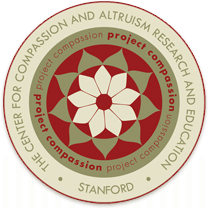Programs
(6 – 8 weeks)
Stanford University’s
COMPASSION CULTIVATION TRAINING (CCT)
(8 weeks)
Humans have a natural capacity for compassion. Work stress, social pressures, and everyday life challenges often make it difficult to maintain and fully express this capacity. Yet it’s possible for each of us to nurture and grow our compassionate instinct. Science is showing that a compassionate attitude can greatly reduce distress people experience in difficult home or work situations, and be a profound personal resource in times of struggle, anxiety, depression, or grief.
CCT is an 8 week course combining the latest neuroscience and clinical psychology with small group exercises and contemplative practice. The program has been shown to increase mindfulness and feelings of connection to others, reduce worry while enhancing happiness, improve emotional regulation and resilience, and significantly expand the ability to extend and receive compassion, including self-compassion. CCT is designed for anyone who wishes to cultivate compassion, personally and/or professionally, for themselves and for others. Includes parents and caregivers, educators, healthcare providers and therapists, for-profit and non-profit business leaders and staff, public service managers and employees, and all individuals seeking to build on a practice of awareness and mindfulness. No previous meditation experience necessary.
CCT was developed at Stanford’s “Center for Compassion and Altruism Research and Education” (CCARE). His Holiness the Dalai Lama has supported CCARE’s work from the outset, including development and dissemination of CCT, because it fits closely with his own commitment to fostering compassion throughout the world. Dr. Thupten Jinpa, His Holiness’s translator of 30+ years, was a principal creator of the course. Learn more about CCARE and CCT at ccare.stanford.edu/education.
Class size capped at 20 or 30 depending on location. To learn more or reserve a spot email mlkeller.cct@gmail.com.
“If you want others to be happy, practice compassion. If you want to be happy, practice compassion.”
Dalai Lama
Fee: $______
ADVANCED COMPASSION CULTIVATION
(8 weeks)
Explore updated research and new practices related to cultivating compassion. Includes broader and deeper exploration of topics directly related to compassion cultivation including mindfulness, creativity, self-compassion, gratitude, resilience, extended circle of loved ones, connection and common humanity, and global compassion.
Prerequisite: CCT.
Fee: $______
CULTIVATING THE WILL TO CHANGE: Science and practice of motivation and self-control
(8 weeks)
Change is always possible but rarely easy. Humans come into the world wired for motivation and self-control, yet we often don’t exercise those abilities skillfully. Bring a personal challenge to the workshop. Bad habit you’d like to break? Good habit you want to establish? A project or dream you’d love to finally get off the ground? Tackle your challenge with tools drawn from current neuroscience and clinical psychology, small group exercises, and contemplative practice. Cultivating and harnessing your own willpower instinct can guide you to make better choices, overcome obstacles, and achieve your goals.
Fee: $______
CULTIVATING COMPOSURE & RESILIENCE: Science and practice of regulating stress
(6 weeks)
Contrary to popular belief, stress doesn’t always make you sick and it doesn’t have to be harmful. Recent research shows stress can make you smarter, stronger and more successful. It can help you learn and grow. It can even inspire courage and compassion. When you rethink your attitude about and approach to stress, you create a different biological reality in your mind and body. In this workshop gain tools and skills drawn from neuroscience and clinical psychology, small group exercises, and contemplative practice. By cultivating composure and resilience, you become good at stress rather than a casualty of it.
Fee: $______


